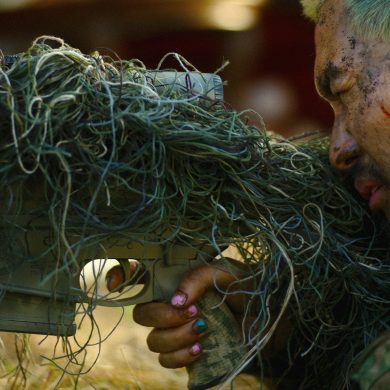Help keep The Curb independent by joining our Patreon.
In 2016, director Tom McCarthy won, with co-writer Josh Singer, the Academy Award for Best Original Screenplay for Spotlight, with the film going on to win the Best Picture award in a surprising move, making it the first Best Picture winner since 1953 to only win one other Oscar. Spotlight is a fantastic film and should be highly rated as one of the very best journalism movies of all time. It isn’t a fancy work, taking place in drab office interiors with characters dressed in standard shirts that you would see in any workplace, but the effect of the storytelling and the depth of the performances from its magnificent cast did the heavy lifting, and creating a powerful depiction of exhausting yet necessary humanitarian work. The film established Tom McCarthy with the filmmaking credit to do anything in the future and say “from Academy Award-winner Tom McCarthy”, which is exactly what it says on the trailer for Stillwater.
The film is credited as being an original screenplay, but it has basis in reality with the story of Amanda Knox, an American woman studying in an Italian university who was wrongfully convicted of the murder of her British flatmate. In the film, Abigail Breslin plays the Knox substitute Allison Baker, who has been imprisoned in France for five years of a nine-year sentence for the suspected murder of her roommate. Her father Bill (Matt Damon) lives in their hometown of Stillwater, Oklahoma but also visits his daughter every six months by flying to France and back. On one trip, Bill starts to gain new information about the man who could be the real murderer and tries to dig deeper, which only halts progress with Allison’s case. Along his quest for his daughter’s vindication, Bill grows close to a local woman Virginie (Camille Cottin) and her daughter Maya (Lilou Siauvaud) and begins to build a better life for himself and make amends for his mistakes as a father.
As a film, Stillwater plugs along smoothly, presenting Damon’s Bill as the most unlikeable of people: a stubborn American who distrusts anything foreign. He looks and speaks like an American cliché or perhaps what more selfless Americans fear they look like when visiting anywhere international. Bill isn’t not a successful person. He’s a construction worker from a nowhere town in Oklahoma that was never close enough to his daughter before she was imprisoned and continues to do the wrong thing in the hopes that something will work one day. Damon’s performance is rather obvious, showing us what he thinks this man would act like without ever letting us believe that he’s a real kind of person. It’s not so much of a transformation as it is a vague impression, like watching a rich CEO try and disguise themselves on an episode of Undercover Boss. Bill is a gun-loving Southern loser who most likely voted for Trump and rambles on about “fake news”, but only in the context of his daughter. I guess the idea is that Bill isn’t meant to be enjoyable and is meant for change, but the film unfortunately does little to give us the feeling that he deserves redemption.
When Bill falls in love with Virginie and becomes a surrogate father to Maya, you find yourself enjoying the movie. It has a soft and grounded approach to events, never letting the score drive events too far emotionally, and keeping the cinematography at a personal level. All of this is after Bill has failed to find the most-likely suspect and we’re about halfway through a 140 minute movie. Allison is allowed for a 24 hour leave, and things seem okay. She begins to forgive her foolish father and sees how much he is trying to do right by people in need. And then the suspect reappears. It might be churlish to think that McCarthy and his co-writers were just going to forget about Bill’s initial quest and end things happily, but I guess that’s where the drama comes to play.
The suspect, Akim (Idir Azougli), comes back into play, and it was at this point that Bill makes his worst decision yet to capture Akim, lock him in a basement without windows or any light whatsoever, and force him to reveal any information about Allison’s roommate or if there was anyone else involved. Of course, the police start noticing signs, Bill frees Akim at the last minute under promise of not telling anyone else but not before he mutters in broken English “Stillwater”. Virginie still discovers Bill’s actions and forces him out of her life, breaking Maya’s heart, they share a tragic goodbye, and Allison is freed sometime later, the real killer having been finally found.
When Allison and Bill return home to Oklahoma, you feel the depressing contrast. The film’s frames were once filled with summer light and colours of the bustling streets of Marseille or the warm surroundings of a French apartment home. Now, back in Stillwater, everything is disgustingly dull. There’s no life in the air, the homes are grey rectangles, some resting on cinderblocks, and you feel how terrible it is to go from such happiness to a life of emptiness. Allison’s release should be cause for celebration, but because of Bill’s actions, it is all empty gestures and cold glances.
In the film’s final scene, Bill confronts Allison about the truth that he suspects. Why did Akim know “Stillwater”? At this point, Allison breaks and confesses the truth, that she had a massive argument with her roommate over unrequited love, and asked Akim to “put her out”, meaning evict her from their place. But Akim did not understand and instead killed the girl and got away with it. Akim remembered the word “Stillwater” because Allison wore a necklace with her hometown’s name on it, a gift Bill gave her before her initial flight to Marseille. The film ends with father and daughter broken by their terrible decisions and forced to face a life of misery.
This tragic ending would have worked had Tom McCarthy and his co-writers not engaged in some rather disgusting artistic liberties. As I mentioned, this story is loosely based on the life of Amanda Knox, though her story is not credited at any point in the credits nor was she consulted during the filmmaking. This is wrong on many levels because of what these filmmakers do with the Amanda Knox substitute character Allison.
Knox had to fight against her 26 year sentence, being only 22 at the time. The Italian press in 2007 vilified her as an obnoxious and clueless American who conspired to get away with murder. Knox was found not guilty in 2011, released and sent home, only for another Italian court case in 2013 to find Knox guilty again, imprisoned for another 2 years, and then finally with a last appeal Knox was fully exonerated. Glaring errors in the Italian court system and corruption allowed an innocent woman to suffer for 8 years, and she continues to fight against suspicion of her involvement with the murder, even though the killer was found and sentenced (later being approved to complete his 16-year term with community service).
Because of how Stillwater plays out, it continues a disgusting message of feeding suspicion about Amanda Knox, painting her as still a possibly guilty and untrustworthy person, something Knox pointed out directly on Twitter in July. Instead of being a more pointed criticism of the kind of conservative and individualistic vigilante mindset that Bill Baker represents, something that only causes more and more damage to innocent people across the world, it backs away and makes Bill’s reprehensible actions justified. He got the truth in the end, however ugly his means may have been. By focusing on him instead of Allison, it further erases Amanda’s story and reframes it as a narrative about a moronic right-wing white American man who may not be perfect but goddamn he tries hard. Yuck.
Stillwater examples irresponsible filmmaking that becomes doubly disappointing when this is from the same person who made Spotlight, a sensitive drama that worked hard to do justice to the real-life victims and tell their important stories. Tom McCarthy and his co-writers ignore the truth in favour of a more “interesting” story, and this is a shameful tactic when considering the real-world truth of the situation. Stillwater’s grounded style is rendered into a boring drama because of its weak and spiteful ending, ruining the dramatic potential of a more pointed thematic resonance.
It’s been a while since this film was released, you can watch it now on Paramount+ with a free trial, but I just couldn’t get the baffling audacity of Stillwater out of my head. Let’s hope we do not see it rear its ugly head come awards season.
Director: Tom McCarthy
Writers: Tom McCarthy, Marcus Hinchey, Thomas Bidegain, Noé Debré
Starring: Matt Damon, Camille Cottin, Abigail Breslin




